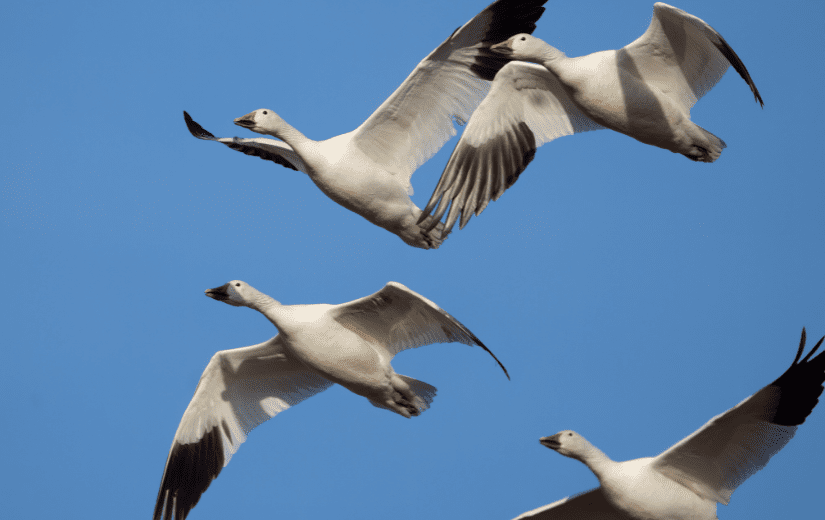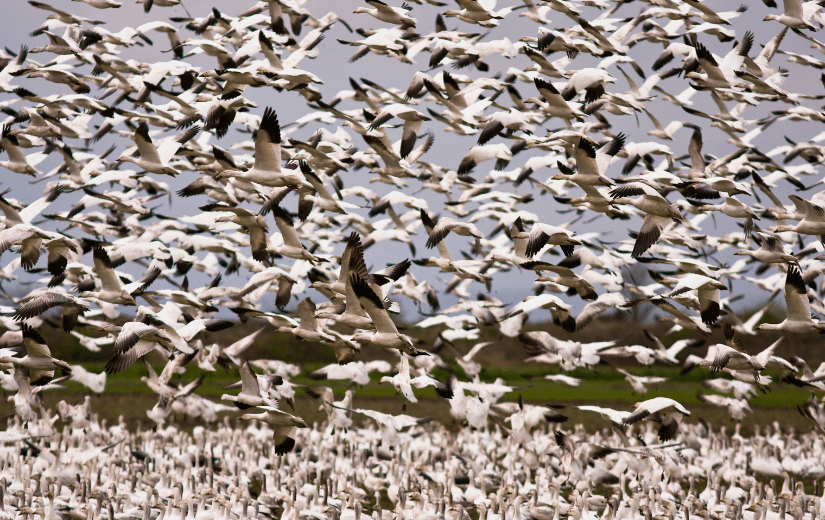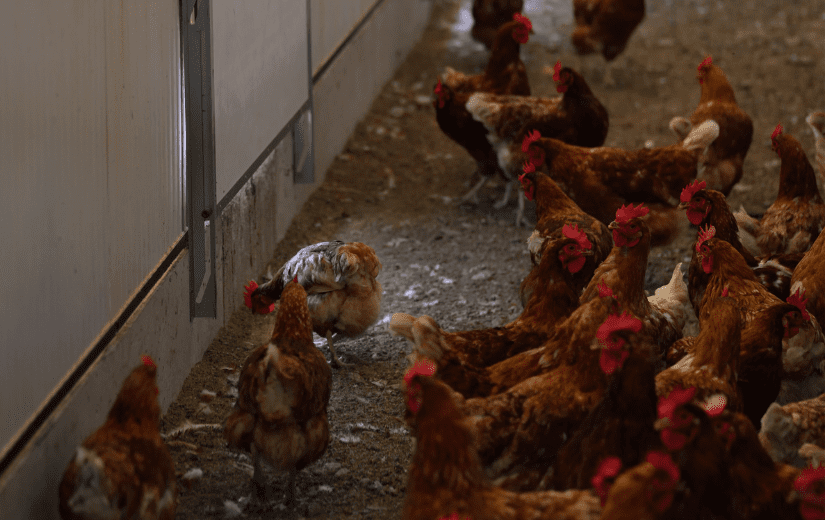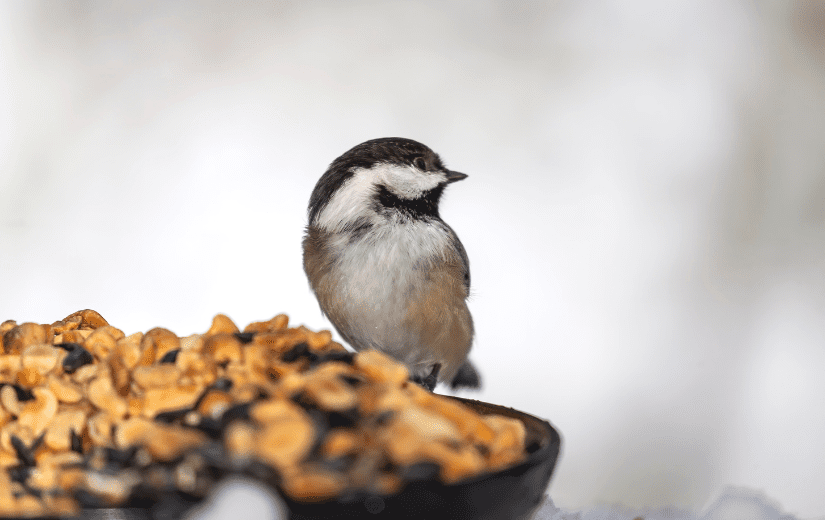Highly pathogenic avian influenza (HPAI) has been heavily featured in the news with impacts across the province and in various species including wild birds and mammals, domestic animals, farmed animals and one human case. While the spread of HPAI is a concern year-round, annual bird migrations in the spring and fall call for additional caution.

What is Avian Influenza?
Avian influenza is a broad term referring to a contagious viral infection that is caused by Type A influenza viruses that can have many subtypes (e.g., H5N1, H7N7). There are two classifications of Avian Influenza: Low pathogenic avian influenza (LPAI) and highly pathogenic avian influenza (HPAI). HPAI can cause severe illness and death in birds, with some cases being asymptomatic, or not presenting symptoms of illness. LPAI is often considered mild or asymptomatic.
Since 2022, there has been a global increase in the spread of HPAI with devastating impacts to wild bird populations, domestic poultry and spillover infections to mammals when viruses spread to new species. Avian influenza spreads through direct contact with bodily fluids and feces from infected birds, or exposure to contaminated surfaces. Influenza viruses can change quickly and adapt when they infect new species, which means careful monitoring and reporting is essential to understanding and reducing the spread of the virus.

Current state of avian influenza in B.C.
Wild birds and mammals
Many wild birds have been impacted by HPAI across the province, particularly aquatic birds such as ducks, geese, gulls, swans, and terns. Wild aquatic birds are the natural reservoir of nearly all avian influenza subtypes, and wild birds are dying in the greatest numbers with the most species being affected. Symptoms of HPAI infection in wild birds may include:
- lack of energy or movement
- nervousness
- tremors
- lack of coordination
- swelling around the head, neck or eyes
- coughing, gasping for air or sneezing
- diarrhea
- sudden death
Several detections of avian influenza have been reported in wild mammals in B.C. including foxes, raccoons, and skunks. Infections may be caused by mammals coming in direct contact with infected wild birds while scavenging on infected carcasses or indirectly through contaminated environments. Symptoms of infection in wild mammals may include:
- seizures
- tremors
- circling
- excess salivation
- inability to walk
Understanding the full scale of avian influenza cases in wild animals can be difficult as animals may pass away and never be found. This means reporting unusual behaviour and deceased wildlife is incredibly important in understanding the full impact of avian influenza on wild animals.
Reported avian influenza detections in wild birds and mammals are available on the HPAI Detections in BC Wildlife and Environmental surveillance dashboard.
Farmed animals
Extensive avian influenza outbreaks in poultry in B.C. started in 2004 and continue today. Most commonly, outbreaks occur when commercial or backyard birds come in direct contact with infected wild birds or contaminated water, feed, or surfaces. Symptoms of avian influenza in poultry can include:
- a drop in egg production
- diarrhea
- hemorrhages on the hock
- high and sudden mortality rates
- quietness or depression
- swelling under the eyes
- swollen or congested wattles or combs
HPAI has been detected in other farmed animals, like cattle, in other countries but has not yet been detected in Canada. Unfortunately, to reduce animal suffering and prevent the risk of disease transmission, farmed animals are euthanized when flocks are confirmed to be infected. B.C. currently has the largest estimated number of domestic birds impacted by HPAI due to a high concentration of poultry farms and locations along the migratory route for wild birds. The Canadian Food Inspection Agency (CFIA) provides updates on the status of ongoing avian influenza responses by province.

Companion animals
There have been no reports of HPAI cases of cats or dogs in B.C. However, there have been reports of infections in companion animals in other provinces and countries, largely caused by direct contact with wild or domestic poultry as well as raw meat, milk and commercial raw food diets. Reported symptoms observed in companion animals include neurological and respiratory problems, and death. The CFIA provides additional information on symptoms, risks and tips for protection in different species of companion animals.
People
Avian influenza can also infect people. In November 2024, B.C. had its first human case of avian influenza. Transmission of avian influenza to people typically occurs when they have had close contact with infected birds or heavily contaminated environments. Symptoms can include:
- fever
- headache
- muscle pain
- runny nose
- sore throat
- exhaustion
- coughing
- irritated eyes
How to keep birds, companion animals and yourself safe
By taking additional precautions, we can all do our part to help reduce the spread of avian influenza. To reduce risks for wild birds, never feed waterfowl, gulls or any other aquatic birds, clean bird feeders and baths regularly even if birds appear healthy, and remove bird feeders if sick birds are observed in your area. Clean up fallen bird seed to prevent congregations of animals.

To protect companion animals from avian influenza, it is recommended to keep cats indoors and dogs leashed to prevent contact with wild bird feces or carcasses. Avoiding raw food diets, particularly those containing poultry, will help to reduce the risk of exposure. If you visit areas with large congregations of birds, disinfect your shoes and thoroughly wash your clothes to prevent transmission risk as avian influenza can persist on clothes and shoes.
To protect yourself from avian influenza, regularly and thoroughly wash your hands and never touch sick or dead wildlife with your bare hands or without following the Public Health Agency of Canada’s handling guidelines. Take additional precautions including:
- If you are in an area where large groups of birds have been, disinfect your shoes and thoroughly wash your clothes.
- If you suspect an animal in your care may have avian influenza, wear gloves, a mask and goggles while interacting with them.
- If you, or someone you know, feels sick after possibly being exposed to avian influenza call your healthcare provider and stay away from others. If you cannot isolate yourself, wear a mask and wash your hands often.
How to report suspected HPAI cases
In any scenario where you suspect a human or wild, companion, or farmed animal may have avian influenza, it must be reported to the appropriate authority. Reporting allows for a swift response to prevent the spread of avian influenza and helps to provide data to regulatory agencies to understand the scope of avian influenza in the province.
To report sick or dead:
- Domestic animals (pets, poultry or farmed animals) – contact the Canadian Food Inspection Agency and B.C.’s Chief Veterinarian through an online webform. Alternatively, if you are unable to submit an online report, you can call the B.C. Animal Health Centre at 1-800-661-9903
- Wild birds – contact the B.C. Wild Bird Mortality Investigation Protocol & Avian Influenza Surveillance Program (PDF) at 1-866-431-2473
- Wild mammals – contact the B.C. Wildlife Health Program at 1-250-751-7246
- Marine mammals – contact the B.C. Marine Mammal Response Network at 1-800-465-4336
After reporting sick wild birds or mammals to the appropriate agency, contact your local wildlife rehabilitator for further instructions to get sick animals help while keeping yourself safe.

